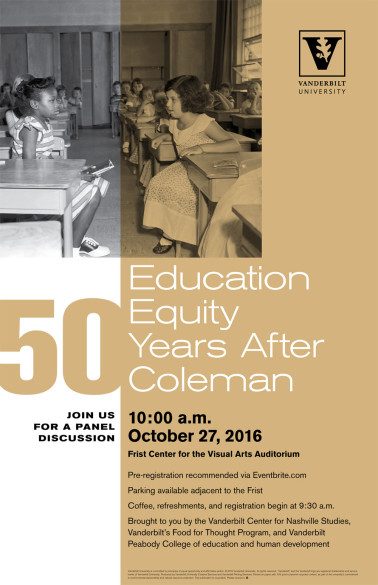
On Oct. 27, a panel of education experts will explore how policymakers, scholars and school leaders are still addressing the pressing questions and concerns raised by the Equality of Educational Opportunity study, popularly known as the Coleman Report. The event, “Education Equity 50 Years After Coleman,” begins with coffee and registration at 9:30 a.m. at the Frist Center for the Visual Arts. The discussion will commence at 10 a.m. and livestreaming will be available (see below).
Commissioned by Congress as part of the 1964 Civil Rights Act and named for its principal investigator, Johns Hopkins sociologist James S. Coleman, Equality of Educational Opportunity is widely viewed as one of the most important education studies of the 20th century. It served as the basis for mass busing and school desegregation efforts, and it stimulated decades of social science research on school and family effects and the relationship between and among race, poverty and academic achievement.
There is a Nashville and Vanderbilt connection to the report: The late Ernest Q. Campbell, dean emeritus of the Vanderbilt Graduate School and professor and chair of sociology and anthropology emeritus, served as co-director of the project with Coleman.

The panel will address the controversial history of school reform efforts and look to the future of education equity.
Catherine Gavin Loss, assistant professor of the practice of leadership, policy and organizations, who specializes in the history of American education and 20th century education policy and reform, will serve as moderator.

“Fifty years after the Coleman Report, U.S. schools still struggle to offer an equitable education to all their students,” said Camilla P. Benbow, Patricia and Rodes Hart Dean of Education and Human Development.
“Disparities in funding, widely varying teacher quality, the impact of immigration, and the re-segregation of schools—not to mention entrenched poverty—are just some of the factors that seem to perpetuate gaps in achievement. Given Vanderbilt’s historic connection to the original report, it is appropriate that we mark its anniversary with a fresh exploration of what the Coleman Report got right and what still needs our attention.”
Panelists are:

- Tennessee Court of Appeals Judge Richard Dinkins (VU Law ’77), whose rulings have addressed the importance of quality teaching on equality of education and who represented the plaintiffs in Nashville’s long-running desegregation case;
- Carol Johnson, former superintendent of Boston Public Schools, consultant to Memphis Schools and to the state Department of Education, and a visiting professor at Vanderbilt’s Peabody College of education and human development;
- Claire Smrekar, associate professor of public policy and education and a consultant with the Civil Rights Division, U.S. Department of Justice, whose research focuses on the impact of desegregation plans and choice policies on families, schools and neighborhoods; and
- Rucker Johnson, associate professor in the Goldman School of Public Policy at the University of California at Berkeley; faculty research fellow of the National Bureau of Economic Research; and research affiliate of the National Poverty Center and the Institute for Research on Poverty, whose research interests focus on the role of poverty and inequality in affecting life chances.
Due to limited seating, advanced registration is recommended through Eventbrite.
Parking is available adjacent to the Frist.
The event is co-sponsored by Vanderbilt’s Center for Nashville Studies; Community, Neighborhood and Local Government Relation’s Food for Thought program; and Peabody College.